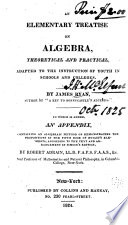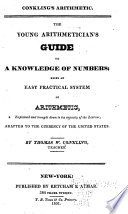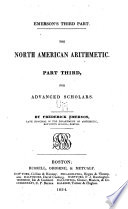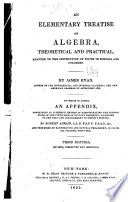 | James Ryan, Robert Adrain - 1824 - 542 pages
...transposition of the terms of the equation. 464. Thus, by transposition, a+d=b-\- c. From which it appears, that the sum of the two extremes is .equal to the...third term in this case be the same as the second, or c=6, the equi-difference is said to be continued, and we have •where it is evident, that the sum... | |
 | Stephen Pike - 1824 - 212 pages
...last terms are called the extremes. Note. — In any series of numbers in arithmetical progression, the sum of the two extremes is equal to the sum of any two terms equally distant from them; as in the latter of the above series 6 + 1=4+3, and =5+2.... | |
 | Warren Colburn - 1825 - 400 pages
...c, d, be four successive terms of a progression by difference. b — a = d — c I .-[-,.. That is, the sum of the two extremes is equal to the sum of the two means. Example. Let 5, 9, 13, 17, be four successive terms. 9+ 13 = 17 +5 = 22. Let a, 6, c, d, e A, »',... | |
 | Warren Colburn - 1828 - 330 pages
...Let a, b, c, d, be four successive terms of a progression by difference. b — a = d — c That is, the sum of the two extremes is equal to the sum of the two means. Example. Let 5, 9, 13, 17, be four successive terms. 9+ 13;= 17 + 5=. 22. Let a,b,c, d,e ..... A, t,... | |
 | Thomas Conkling (W.) - 1831 - 302 pages
...two extremes by half the number of terms. * In any series of numbers, in arithmetical progression, the sum of the two extremes is equal to the sum of any two terms equally distant from then}; as in the series above, 2 +• 10, is equal to 4 +• 8,... | |
 | Ira Wanzer - 1831 - 408 pages
...of the four, 2, 4, 7, 0 ; here 2+9=4+7=11. THEOREM 2. — Inany continued arithmetical progression, the sum of the two extremes is equal to the sum of any two means which are equally distant from the extremes, or equal to double the middle term when... | |
 | Frederick Emerson - 1834 - 300 pages
...and 1+7 = 3+5. Also in the series 11, 8, 5, 2, 11+2 = 8 + 5. THEOREM II. In any equidifferent series, the sum of the two extremes is equal to the sum of any two means, that are equally distant from the extremes; and equal to double the middle term, when... | |
 | James Ryan, Robert Adrain - 1835 - 388 pages
...transposition of the terms of the equation. 409. Thus, by transposition, a-\-d=b-\-c. From which it. appears, that the sum of the two extremes is equal to the sum...third term in this case be the same as the second, or c—b, the equi-difference is said to be continued, and we have a+d=2b ; or &=£ (af- d) ; where it... | |
 | James Bryce - 1837 - 322 pages
...a decreasing one, the last term would be a — (я — 1)<¿ 170. Cor. In an equidifferent series, the sum of the two extremes is equal to the sum of any two terms equally distant from them« or to twice the middle term, if the number of terms be odd:... | |
 | John Radford Young - 1839 - 332 pages
...equation, and there results 26 = a + c. THEOREM 3. In any series of quantities in arithmetical progression, the sum of the two extremes is equal to the sum of any two terms equally distant from the extremes ; or it is equal to twice the middle term, when the... | |
| |